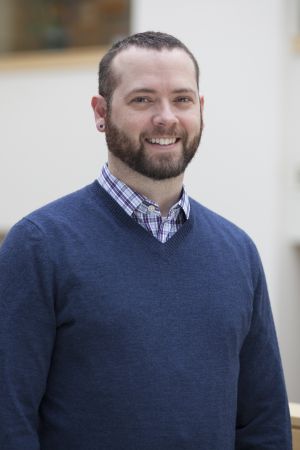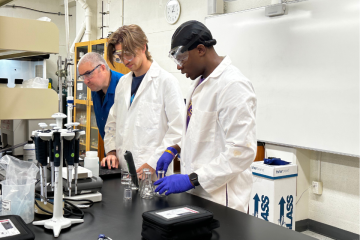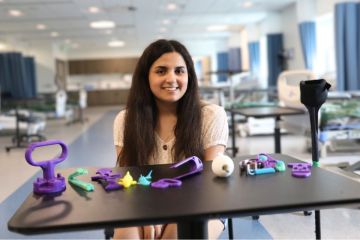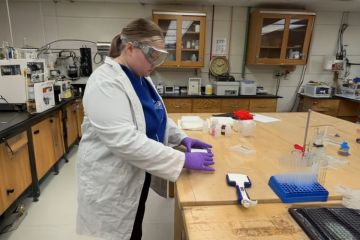University Awarded Nearly $1M to Improve HIV Education for Black Gay Men

Widener University’s Interdisciplinary Sexuality Research Collaborative (ISRC) has received a third year of funding from ViiV Healthcare, bringing the company’s total investment in Widener to nearly $1 million and allowing the ISRC to continue developing sexuality education resources and tools to be used in community programs for black gay and bisexual men.
The $262,000 extension of the ACCELERATE! Making Sex Ed Relevant grant will continue funding the ISRC’s work through December 2019, as the team focuses on the health and well-being of black men who have sex with men in Baltimore, Maryland and Jackson, Mississippi. Both cities ranked in the top 10 for the highest HIV diagnosis rate in the nation in 2014.
In addition, the ISRC also recently received a mini-grant of $25,000 from ViiV to collaborate with Jackson State University, a historically-black university, to create an implementation plan for the toolkit.
Black gay and bisexual men are more affected by the HIV epidemic than any other group in the United States, according to the Centers for Disease Control and Prevention (CDC). The CDC warned that if current HIV diagnoses persist, approximately 1 in 2 black men who have sex with men will be diagnosed with HIV during their lifetime. The rate is 1 in 4 for Latino men who have sex with men and 1 in 11 for white men who have sex with men.
Justin Sitron, director of the ISRC and Widener’s Center for Human Sexuality Studies and associate dean in the School of Human Service Professions, said the CDC rates are alarming and should be a wakeup call for everyone to recognize the systemic inequities that are creating barriers and health care disparities for black gay and bisexual men.
“The ISRC is taking a dual approach of both training health care providers to be more culturally responsive and supporting community programs focused on the sexual well-being of gay men,” Sitron said. “We are working with community and outreach programs run by local agencies to share sex education tools and materials that are inclusive and empower black gay and bisexual men. We want to meet them where they are and give them what they have been asking for.”
In 2015, ViiV Healthcare, a global specialist HIV company dedicated to delivering advances in treatment and care for people living with HIV and for people at risk of becoming infected with HIV, launched a four-year, $10 million initial investment in response to the HIV epidemic.
Aligned with the national HIV/AIDS strategy, the ACCELERATE! Initiative is meant to speed up community-driven solutions to increase access and engagement in supportive HIV care and services in communities disproportionately impacted by HIV/AIDS.
Through the initiative, Widener’s ISRC received two $350,000 grants over the past two years. The funding allowed the ISRC team to create sexual educational materials that are relevant to black gay men and then to launch a pilot program based on the materials in August.
The latest grant extension will support the next phase of training community agencies to deliver these materials themselves. The ISRC team is working in Baltimore with Gay, Lesbian, Bisexual, and Transgender Community Center of Baltimore and Central Maryland, the JAQUES Initiatives, and the Community Cares Project. In Jackson, the team is working with My Brother’s Keeper, Inc. and The SPOT (Space Place Over Time), a drop-in resource center at the Jackson Medical Mall.
Javontae Williams, an applied research scientist for the ISRC, said the pilot program is showing great success.
“We are already receiving a positive response from community participants who feel affirmed by the educational content because it addresses key issues important to them,” he said. “Black gay men in the program report feeling more empowered and engaged in their sexual health after completion.”
Following a needs assessment, the grant will also fund another ISRC pilot program to train health care service providers – from doctors to receptionists to medical billing specialists – on how to best serve black gay men. This is especially important because a recent study in The Lancet found just 24 percent of black gay and bisexual men living with HIV stay in care and 16 percent achieve viral suppression, compared with 43 percent and 34 percent for white men.
Widener’s Center for Human Sexuality Studies, already a leading national training center for sexuality education and sex therapy, established the ISRC to support interdisciplinary research endeavors focused on topics related to human sexuality. The ISRC is comprised of faculty, staff, and both graduate and undergraduate students, and is equipped to execute research projects of various scopes and sizes. The Center for Human Sexuality Studies houses one of the only doctoral programs in human sexuality studies at a fully accredited university in the U.S, and the ISRC provides opportunities to support and empower doctoral students’ research skill development.




